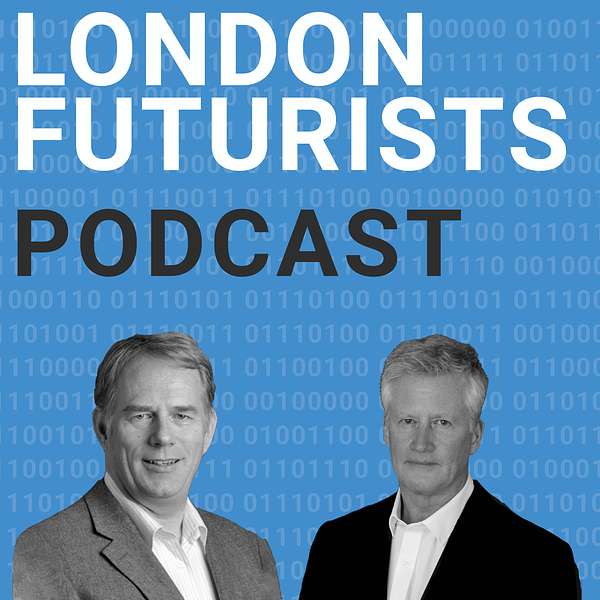
London Futurists
Anticipating and managing exponential impact - hosts David Wood and Calum Chace
Calum Chace is a sought-after keynote speaker and best-selling writer on artificial intelligence. He focuses on the medium- and long-term impact of AI on all of us, our societies and our economies. He advises companies and governments on AI policy.
His non-fiction books on AI are Surviving AI, about superintelligence, and The Economic Singularity, about the future of jobs. Both are now in their third editions.
He also wrote Pandora's Brain and Pandora’s Oracle, a pair of techno-thrillers about the first superintelligence. He is a regular contributor to magazines, newspapers, and radio.
In the last decade, Calum has given over 150 talks in 20 countries on six continents. Videos of his talks, and lots of other materials are available at https://calumchace.com/.
He is co-founder of a think tank focused on the future of jobs, called the Economic Singularity Foundation. The Foundation has published Stories from 2045, a collection of short stories written by its members.
Before becoming a full-time writer and speaker, Calum had a 30-year career in journalism and in business, as a marketer, a strategy consultant and a CEO. He studied philosophy, politics, and economics at Oxford University, which confirmed his suspicion that science fiction is actually philosophy in fancy dress.
David Wood is Chair of London Futurists, and is the author or lead editor of twelve books about the future, including The Singularity Principles, Vital Foresight, The Abolition of Aging, Smartphones and Beyond, and Sustainable Superabundance.
He is also principal of the independent futurist consultancy and publisher Delta Wisdom, executive director of the Longevity Escape Velocity (LEV) Foundation, Foresight Advisor at SingularityNET, and a board director at the IEET (Institute for Ethics and Emerging Technologies). He regularly gives keynote talks around the world on how to prepare for radical disruption. See https://deltawisdom.com/.
As a pioneer of the mobile computing and smartphone industry, he co-founded Symbian in 1998. By 2012, software written by his teams had been included as the operating system on 500 million smartphones.
From 2010 to 2013, he was Technology Planning Lead (CTO) of Accenture Mobility, where he also co-led Accenture’s Mobility Health business initiative.
Has an MA in Mathematics from Cambridge, where he also undertook doctoral research in the Philosophy of Science, and a DSc from the University of Westminster.
London Futurists
Questioning the Fermi Paradox, with Anders Sandberg
In the summer of 1950, the physicist Enrico Fermi and some colleagues at the Los Alamos Lab in New Mexico were walking to lunch, and casually discussing flying saucers, when Fermi blurted out “But where is everybody?” He was not the first to pose the question, and the precise phrasing is disputed, but the mystery he was referring to remains compelling.
We appear to live in a vast universe, with billions of galaxies, each with billions of stars, mostly surrounded by planets, including many like the Earth. The universe appears to be 13.7 billion years old, and even if intelligent life requires an Earth-like planet, and even if it can only travel and communicate at the speed of light, we ought to see lots of evidence of intelligent life. But we don’t. No beams of light from stars occluded by artificial satellites spelling out pi. No signs of galactic-scale engineering. No clear evidence of little green men demanding to meet our leaders.
Numerous explanations have been advanced to explain this discrepancy, and one man who has spent more brainpower than most exploring them is the always-fascinating Anders Sandberg. Anders is a computational neuroscientist who got waylaid by philosophy, which he pursues at Oxford University, where he is a senior research fellow.
Topics in this episode include:
* The Drake equation for estimating the number of active, communicative extraterrestrial civilizations in our galaxy
* Changes in recent decades in estimates of some of the factors in the Drake equation
* The amount of time it would take self-replicating space probes to spread across the galaxy
* The Dark Forest hypothesis - that all extraterrestrial civilizations are deliberately quiet, out of fear
* The likelihood of extraterrestrial civilizations emitting observable signs of their existence, even if they try to suppress them
* The implausibility of all extraterrestrial civilizations converging to the same set of practices, rather than at least some acting in ways where we would notice their existence - and a counter argument
* The possibility of civilisations opting to spend all their time inside virtual reality computers located in deep interstellar space
* The Aestivation hypothesis, in which extraterrestrial civilizations put themselves into a "pause" mode until the background temperature of the universe has become much lower
* The Quarantine or Zoo hypothesis, in which extraterrestrial civilizations are deliberately shielding their existence from an immature civilization like ours
* The Great Filter hypothesis, in which life on other planets has a high probability, either of failing to progress to the level of space-travel, or of failing to exist for long after attaining the ability to self-destruct
* Possible examples of "great filters"
* Should we hope to find signs of life on Mars?
* The Simulation hypothesis, in which the universe is itself a kind of video game, created by simulators, who had no need (or lacked sufficient resources) to create more than one intelligent civilization
* Implications of this discussion for the wisdom of the METI project - Messaging to Extraterrestrial Intelligence
Selected follow-up reading:
* Anders' website at FHI Oxford: https://www.fhi.ox.ac.uk/team/anders-sandberg/
* The Great Filter, by Robin Hanson: http://mason.gmu.edu/~rhanson/greatfilter.html
* "Seventy-Five Solutions to the Fermi Paradox and the Problem of Extraterrestrial Life" - a book by Stephen Webb: https://link.spring
Elevate how you lead with insight from today’s most influential executives.
Listen on: Apple Podcasts Spotify

